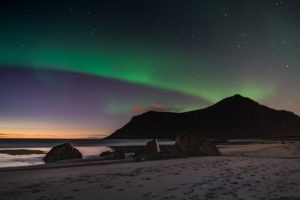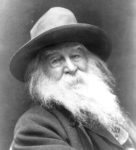
On the beach at night alone,
As the old mother sways her to and fro singing her husky song,
As I watch the bright stars shining, I think a thought of the clef
of the universes and of the future.
A vast similitude interlocks all,
All spheres, grown, ungrown, small, large, suns, moons, planets,
All distances of place however wide,
All distances of time, all inanimate forms,
All souls, all living bodies though they be ever so different,
or in different worlds,
All gaseous, watery, vegetable, mineral processes, the fishes, the brutes,
All nations, colors, barbarisms, civilizations, languages,
All identities that have existed or may exist on this globe, or any globe,
All lives and deaths, all of the past, present, future,
This vast similitude spans them, and always has spann’d,
And shall forever span them and compactly hold and enclose them.





About Walt Whitman
Walt Whitman (1819 – 1892) was an American poet, essayist and journalist. He is considered among the most influential poets in the American canon, often called the father of free verse. Born on Long Island in New York State, he lived much of his life in Brooklyn. Whitman worked as a journalist, a teacher, and a government clerk. Whitman's major work, Leaves of Grass, was a poetry collection that he first published in 1855 with his own money. The work was an attempt at reaching out to the common person with an American epic, and he continued expanding and revising it until his death. During the American Civil War, he went to Washington, D.C. and worked in hospitals caring for the wounded. His poetry often focused on both loss and healing. After suffering a stroke in 1873, Whitman moved to Camden, New Jersey to be nearer to family. When he died at age 72, his funeral was a public event, and thousands lined the streets of Camden to watch his funeral procession. He left a strong legacy of work, and was claimed as the first “poet of democracy” in the United States.
Photo courtesy of Creative Commons.








